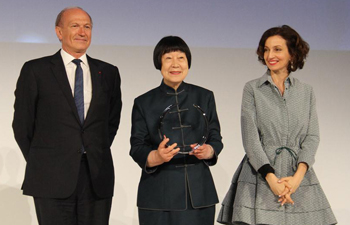BEIJING, March 24 (Xinhua) -- History tells that trade wars are a losing game. No one benefits, and everyone ends up a bit bruised.
Despite the risk of triggering a trade war, U.S. President Donald Trump signed an executive memorandum that could result in heavy tariffs on up to 60-billion-U.S.-dollar imports from China as well as restrictions on Chinese investments.
The unilateral move is a bullying tactic long played by Washington in the face of trade disputes, which uses its superior economic status to force concessions from its partners.
The strategy isn't a wise one, especially in today's world where the economic and trade interests of all countries are intertwined. If a trade war breaks out, no one escapes unscathed.
Some say China benefits more in its trade with the United States, and therefore China would lose more in a trade war; others argue China stands to lose little given its status as the world's second largest economy.
Both arguments miss the mark for one simple reason: trade ties between the world's two largest economies are fundamentally reciprocal. Statistics from the U.S.-China Business Council show that the bilateral economic relationship supports roughly 2.6 million jobs in the United States across a range of industries, among which about 104,000 jobs were created by Chinese investment.
Today, American consumers enjoy low-priced products made in China, and Chinese businesses realize profits in the United States. The relationship is win-win.
The last thing Beijing wants is a trade war spoiling this positive dynamic. But should it happen, the Chinese economy is resilient enough to manage it.
After years of painful adjustment, the Chinese economy today is less dependent on foreign trade, and as the economy continues to expand while the country's debt growth slows, Beijing has a broader macro-economic policy space.
In the meantime, by deepening domestic reforms, promoting industry restructuring and diversifying its export markets, China is capable of turning a crisis into an opportunity for further economic progress.
For example, in Japan's trade war with the United States in the 1980s, Japanese industries were forced to lower their production costs and promote technological innovation. As a result, the country's exports resumed growth after a short period of stagnation. China could follow Japan's lead should a full-blown trade war occur.
Currently, the global economy is in the midst of a delicate recovery. Any protectionist or unilateral move -- such as the one taken by the Trump administration -- could stifle momentum and threaten a long-awaited return to growth.
Trade isn't a zero-sum game, something Washington ought to realize. If not, all parties will be dragged into the abyss of a conflict where no one emerges a winner.

















